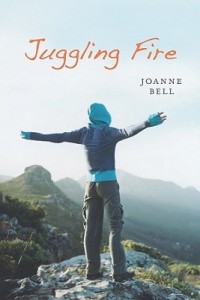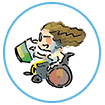 Summary: Sixteen year-old Rachel has unanswered questions in her life. Her father disappeared when she was only a child, and since his disappearance Rachel has been struggling to figure out whether he didn’t come back as he promised because he couldn’t or because he didn’t want to. Rachel prepares to go on a journey with her dog Brooks to find out for herself what really happened. Venturing to their family cabin in the Yukon where her father was last seen, she and Brooks set out across the Tundra, encountering challenges in the form of a bear, weather and dwindling resources. In a modern day fairy tale, Rachel is out to save her father’s reputation, but also herself in the process.
Summary: Sixteen year-old Rachel has unanswered questions in her life. Her father disappeared when she was only a child, and since his disappearance Rachel has been struggling to figure out whether he didn’t come back as he promised because he couldn’t or because he didn’t want to. Rachel prepares to go on a journey with her dog Brooks to find out for herself what really happened. Venturing to their family cabin in the Yukon where her father was last seen, she and Brooks set out across the Tundra, encountering challenges in the form of a bear, weather and dwindling resources. In a modern day fairy tale, Rachel is out to save her father’s reputation, but also herself in the process.
Number of Pages: 171
Age Range: 14-16
Review: In a book that is largely an introspective, isolated journey of one young woman and her dog, Juggling Fire by Joanne Bell explores the concept of fairy tales and how they look in real life.
Rachel’s story isn’t the easiest read. I had trouble with the thought of a mother letting her daughter venture out into the wilderness of the Yukon on her own. It’s also difficult to maintain a steady plot pace when the main character is the only one who can talk and is on her own for the majority of the book. In the grand scheme of things, not a lot happens plot-wise as a result.
But despite its challenges, Juggling Fire is a read I highly recommend. It’s a rare story of a sincerely independent young woman who proves she can take care of herself when it comes to surviving on the northern Tundra landscape. Rachel deals with a bear, she tends to her wounded dog, she scares off wolves when needed and she can fish. And this is all on top of performing the day-to-day aspects of surviving that come with building camp sites, fires and cooking nutritious, high-calorie foods to fuel the body. Rachel does all of this by herself, and proves she is entirely capable in handling any situation that comes her way. She is quite level-headed and resourceful.
The other aspect I love is that Rachel is unabashedly an introvert. Her father was too, and both of them find themselves most at home surrounded by the quietness and seclusion of nature. While near the end of the book Rachel is anticipating the arrival of her mother, it is more because of everything she has been through rather than loneliness. Rachel is a wonderful girl who is comfortable being alone with herself, otherwise she never would have made the trip in the first place.
The best part of Rachel’s story is her vivid inner-life. As a young girl she made a point of memorizing fairy tales, creatively re-writing them as she grew. I love how Bell connects fairy tales with Rachel’s experiences, because her journey contains a lot of the same elements found in such stories. Rachel is, in a way, a hero, because she ventures on a journey away from home to learn the truth of what happened to her father. What she learns has the power to change not only her life, but the lives of her mother and sister as well.
I don’t want to write much about Rachel’s father because I don’t want to wreck Bell’s suspense, but I loved how she developed him as an absent character who had a profound effect on the others’ lives. I truly didn’t know how his story was going to turn out, and it could have gone either way.
My favourite character was Brooks, the dog. Is there anything better than a journey with the companionship of a beloved dog?
I love this book as an empowering pick for early to mid female teen readers because it has a great message about what girls are capable of and how fairy tales are not all princesses being rescued by handsome princes. Happy to be reading it for the second time.
Memorable Quotes:
“Mom kept the tales alive because she repeated them to me. The trouble is that I’m not sure anymore what Mom made up and what really came from the book. And it’s started to matter. After Mom finished telling them, I started changing them around too. I couldn’t help it. The characters just got sick of being stuck in my head. They felt like victims with destinies out of control. They needed fresh starts and original plot twists.” – Rachel talking about how she was exposed to fairy tales from Juggling Fire by Joanne Bell, page 15
“Maybe I like fairy tales so much because danger is necessary for heroism. It’s not meaningless. When someone calls a story just a fairy tale, they usually mean two things. First, they mean that it’s not true. Second, they meant that it has a happy ending. Kind of strange, I think, because fairy tales are brutal. If they end happily, it’s only because the characters who remain alive just call the happy part the end. ‘Whoa!’ they shout, waving at the author. ‘Stop here while we’ve got a breather. Don’t go any farther down this trail.’
It’s not happy for the princes who’ve died honorably or their old mothers rattling about in palaces pining for them to gallop home. It’s not always so merry for the villagers who’ve been picked off by the open-jawed, flame-breathing dragons chasing them down the cobblestones. About the best the survivors can do is make tales of heroism to remember the slaughtered and keep their heads down and hope their own loved ones stay home.
That’s a key part of fairy tales: staying home, which is usually way safer than going on a quest. Everyone knows what old maps said at the borders to uncharted lands: ‘Therein lie dragons.'” – Rachel from Juggling Fire by Joanne Bell, page 21
“I ease up, not breathing. In this moment, I’m alive. Maybe I won’t be tomorrow, but I don’t care anymore. It’s a fine autumn day, sparkling with sun and fresh snow. Today while the Earth is turning, I get to be alive on it. And I’m glad.” – Rachel from Juggling Fire by Joanne Bell, page 165
Juggling Fire by Joanne Bell is published by Orca Books, (2009).




 Amy Mathers has been passionate about reading from a very young age, and hopes others will share her enthusiasm for funding a teen book award.
Amy Mathers has been passionate about reading from a very young age, and hopes others will share her enthusiasm for funding a teen book award. 





